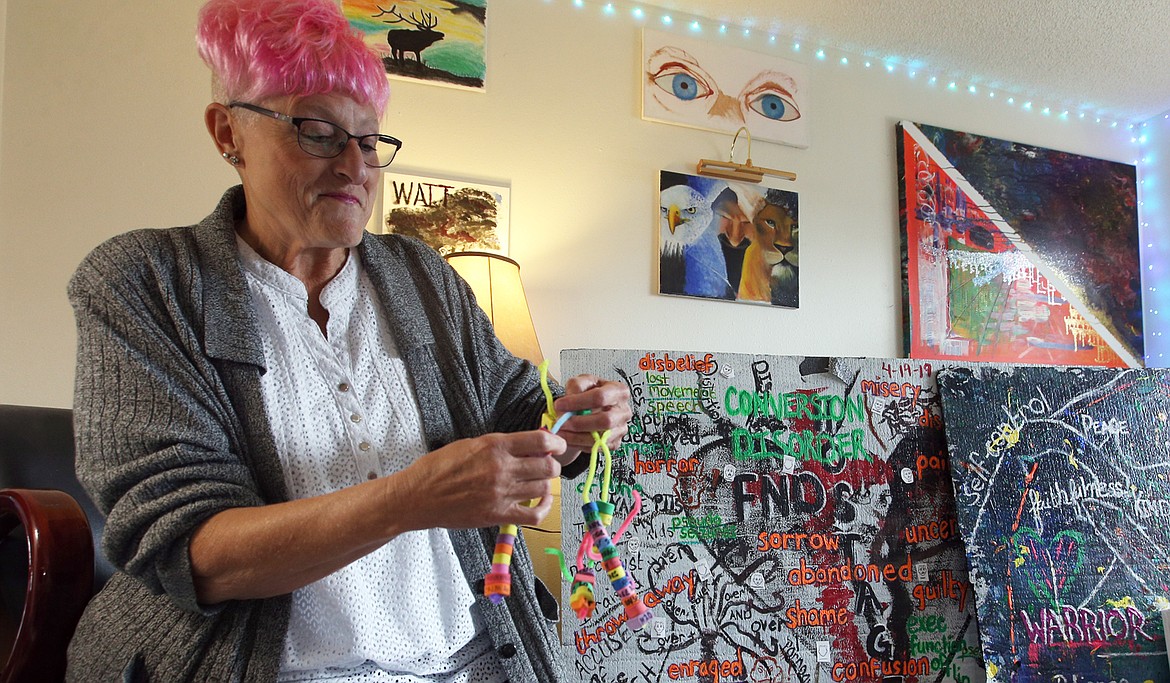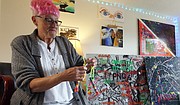'I came back'
COEUR d’ALENE — Linda Hines is looking forward to Mother’s Day. For the first time in years.
Because today, she is herself again. She is brimming with joy, hope, and confidence — things she hasn’t felt in a long time.
“I’m back,” she said Friday as she sat in her Coeur d’Alene apartment, surrounded by her artwork. “I’m going to be a working productive member of society again.”
Hines is going to be more than that.
This woman with pink hair plans to be the best mom, the best friend, the best person, she can be.
She’ll visit her mother in Kellogg today, and is eager to be with her three grown children. She recently went fishing with the 20-year-old and the 17-year-old.
“Relationships are being established,” Hines said.
She hopes to spend time with her eldest son. When she recently asked him if he remembered Mother’s Day was coming up, she said the response was, “No, I haven’t had a mother for a few years.”
The 61-year-old Hines believes she is about to change that.
“I feel like our relationship has been restored,” Hines said.
She is at ease and relaxed during this conversation with The Press, responding easily to questions.
“I couldn’t communicate like this in December,’ she said. “You could have asked me a question, but I won’t have been able to answer it.”
It’s been a long road to get here.
It was May 9, 2014, when Hines began a battle with what is referred to as FND, which is Functional Neurological Disorder.
It is defined by FND Hope as “a genuine cause of neurological symptoms thought to be the result of the brain’s inability to send and receive signals properly. It is as common and produces disability and impairment of quality of life of similar severity to that seen in people with Parkinson’s or MS.”
It goes on to state, “It is unknown why people develop FND.”
Hines doesn’t know what brought it on, but she does know she was healthy, had a family, earned a doctorate degree, traveled, and worked in behavioral health.
Seven years ago, she says she froze. Life as she knew it came to a halt. Without warning, FND found her.
Initially, she thought she had a stroke.
“I couldn’t do anything,” she said “I lost everything.”
Looking back, she believes it may have had to do with her fears for her children and a difficult family situation.
Hines said she couldn’t go out and stayed isolated. Couldn’t function like normal. Couldn't process thoughts. Couldn’t get her body to respond. She could read, but not remember what she read. Lights and sounds, she said, were her predators.
She recites a list of symptoms she attributes to FND: pseudo amnesia, pseudo dementia, pseudo seizures, loss of immediate memory, delayed memory, executive function, motor function and emotional regulation.
It got worse. She ended up giving guardianship of her children to her older brother.
“I couldn’t remember them,” she said.
For a time, she was homeless, hungry and lived in a shed, with bugs as her constant companions. Life felt hopeless. She had suicidal thoughts.
“I just cried and cried because I knew I wasn’t alone,“ she said. “I wasn’t the only one out there.”
Hines fought back.
She began painting to express herself. Artistic talent within came out.
One painting she called “Hostage.” Another, “Breakthrough.” One is “The Battle” and another, “The serpent.”
“The serpent came into my room and stole my function,” she said.
But on Jan. 2, 2021, she got it back. She’s not sure why. Perhaps the therapy she underwent. Perhaps the paintings that decorate her apartment. Perhaps the notes she kept. Maybe the boot camp of sorts she created as a reminder of daily disciplines. Or the mantras she repeated: “I am worthy. I am safe. I am secure.”
Perhaps her refusal to surrender.
“I don’t know,” she said. “But I came back.”
She had been what she referred to as an “FNB warrior” for 2,430 days. She remembers waking up in the middle of the night, feeling her old self returning, and writing a poem, “Until It Passes.”
As she reads it, her voice chokes with emotion and she tears up.
“How long will this symptom last? ‘Until it passes,’ whispers a still, small voice in the wind.”
She goes on.
“How long will this last? I now hear love whisper in the wind, ‘Until it passes.’ I now feel love’s hand gently touch my cheeks as he looks into my eyes and his love penetrates my entirety.”
The next morning, she went shopping, alone. No walker. Just carried stuff like anyone else might. She hadn't done that in years.
“I am shaking,” she recalled. “I’m just shaking like a leaf because I’m going shopping, I’m healed. I’m so excited I want to tell somebody I’m healed but it doesn’t really feel like it.”
In a scale of one to 10, she compares herself years ago to today in different categories.
Horror, 10. Fear, 10. Rage, 10. Discomfort, 10. Exhaustion, 10. Fatigue, 10. Pain, 10, Movement, 0. Faith, 0. Hope, 0, Love, 0.
And today?
Horror, 3. Fear, 0. Rage, 0. Exhaustion, 10. Fatigue, 10. Pain, 5. Discomfort, 10. Movement, 5. Faith, 10. Hope, 10. Love, 10.
At that, Hines beams with a big smile. Her eyes shine. She has high hopes to be a “performance and trauma alignment coach” for others fighting what she went through.
“I want to have all of the tools ready so people can get on board with everything they need right up front,” she said.
Her business card has the words “Coaching 4 Purpose and Passion.”
She believes she can find the root causes of FND and prevent it from afflicting others. According to the National Organization for Rare Disorders, FND affects about 20 people per 100,000.
“I want to be a voice. I want to change the world for all the missing people,” she says.
Missing people?
“You get lost and nobody can help you and you just get stuck there, and I want to help them. I know now the trauma is in our nervous systems and the old neural connections.”
Hines has even been leading a weekly art class for kids in her apartment complex.
“This is my giving back. I want to teach the kids love and kindness,” she said.
Her health is returning, too. She’s been swimming in the pool at the Kroc Center, having fun in a mermaid outfit of sorts. She can walk a mile in 17 minutes, when it used to take her 40 minutes.
Hines says she still has limitations, but just as she says that, she corrects herself: “Not really. Just learn the workarounds.”
She knows her return to life as she knew it will be filled with trials. But knowing she is rebuilding relationships with her children is at the core of what drives her and gives her strength to carry on.
“I love them,” she said.



